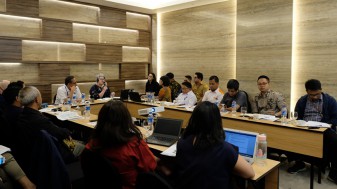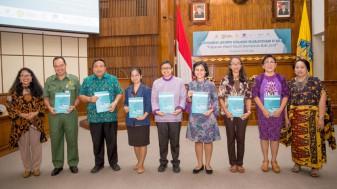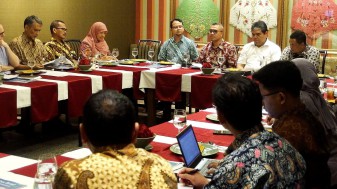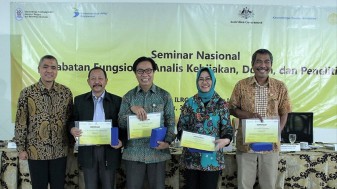The SMERU Research Institute (SMERU) is an independent institution that conducts public policy research and studies. Since it was established in 2001, SMERU has been the leading institution carrying out studies on poverty and disparity. SMERU uses qualitative, quantitative and combination methods to conduct research on social-economic issues affecting poor and vulnerable people in Indonesia. SMERU’s vision is to achieve an Indonesian and global society that is free from any form of poverty and disparity through research for evidence-based policymaking. To realize this vision, SMERU is playing an active role in research activities that highlight the impact of government programs and policies, and is communicating its research findings to the public and relevant stakeholders.
One of SMERU’s research studies that influenced the policymaking process was on remote learning during the COVID-19 pandemic. SMERU’s research findings and policy recommendations to mitigate the learning disparity during the pandemic have been adopted by the Ministry of Education and Culture (Kemdikbud)[1] in the Guideline to Implement the Curriculum at Educational Units in Special Circumstances (Ministerial Regulation No. 719/P/2020) as one of the government’s steps in mitigating remote learning disparity. Meanwhile, in the context of inclusive economic development, SMERU also supported the Ministry of National Development Planning/National Development Planning Agency (Bappenas) to strengthen the creation of the Inclusive Economic Development Index (IPEI) before the development of the National Mid-Term Development Plan (RPJMN) 2020-2024. Inclusive economic development itself has become a priority in RPJMN 2020-2024.
Mitigating Learning Disparity during the COVID-19 Pandemic
From 15 April–10 May 2020, SMERU conducted the first online survey targeting a number of elementary schools to map learning-from-home practices in various regions in Indonesia during the COVID-19 pandemic. This survey managed to collect data from 407 respondents, of whom more than 77 percent were women. Based on the region, 58 percent of respondents taught on Java Island, while the remaining 42 percent were spread across many regions outside of Java Island, except Papua. The survey results demonstrated that learning-from-home practices greatly differ among regions in Indonesia. This variation was caused by limited facilities for online learning, and teachers’ creativity and ability to adapt to the changes. As a result, learning gaps occurred in which negative impacts were felt more by students outside of Java Island.
To have a deeper understanding of the issues and the factors driving learning gaps, SMERU conducted a phone survey as the second phase of its survey with teachers, and in-depth interviews with teachers, principals and parents during May and June 2020. Study results found that during the COVID-19 pandemic, ineffective remote learning activities had increased existing learning gaps. Students in high-quality schools, from families with a good income and parents who cared about their children’s learning could still learn optimally during the pandemic. Meanwhile, students without adaptive teachers, with limited access to sufficient technology, limited internet access and lack of parental mentoring, lost learning opportunities they would have received under normal circumstances. Learning gaps were not only visible among regions or schools, but also among students in the same class. If this condition continues, students left in these less-advantageous situations could potentially experience learning loss.
Since May 2020, SMERU has communicated the findings of this study intensively to the Ministry of Education and Culture (Kemendikbud), specifically the Directorate General (Dirgen) of Teachers and Education Personnel, special staff of the minister, and the Basic Education Working Group (Pokja). To mitigate learning disparities/gaps, SMERU recommends a more systematic effort to improve the quality of learning from home, and to prepare teachers to teach by considering the different learning abilities of students in their respective classes. This variety of learning abilities can be identified through a diagnostic assessment to examine learners’ competence, strengths and weaknesses. SMERU’s efforts in communicating and advocating its research results and policy recommendations paid off, as the government then took measures to mitigate learning gaps during the COVID-19 pandemic. On 4 August 2020, the Minister of Education and Culture (Mendikbud) issued Ministerial Regulation No. 719/P/2020 on the Guideline to Implement the Curriculum on Special Circumstances, in which SMERU’s recommendations on diagnostic assessment were adopted.
Inclusive Economic Development
SMERU continues to be committed to supporting policy development and increasing the understanding of stakeholders on the importance of more inclusive and research-based policymaking. With support from the Knowledge Sector Initiative (KSI) and a collaboration with Bappenas, SMERU contributes to building and developing Indonesia’s Inclusive Economic Development Index (IPEI), launched in July 2018 at the Indonesia Development Forum. IPEI is a comprehensive measurement that examines and measures the inclusivity level of development in Indonesia, both currently and in future. This index is the first specific index in the world that measures inclusive economic development, adapting to the Indonesian context and measuring the index not only at the national level but also provincial and district/city level.
Divided into three pillars, namely the economic growth and development pillar, income equality and poverty reduction pillar, and access and opportunity expansion pillar, IPEI has the potential to influence economic development policies to become more inclusive, both at the national and local level. Since its launch, SMERU has collected indicator data at the provincial and district level, supported by Bappenas and the Ford Foundation. With KSI’s support, SMERU carried out a series of case studies in three provinces (Aceh, East Kalimantan and West Java) and discussions on using IPEI to improve economic development inclusiveness in seven provinces (Aceh, East Kalimantan, West Java, South Sulawesi, Bali, East Nusa Tenggara and Banten). In West Java, SMERU held policy discussions in the form of local development forums. These were attended by more than 400 participants, mostly representatives of district/city governments in West Java, to present their case study findings, promote inclusive economic development, and as an event to exchange knowledge with all parties, not only among local governments but also among academics and community organization representatives. This event increased public discourse on inclusive economic development policies and poverty eradication strategies, which ultimately drove the Government of West Java to sign a Memorandum of Understanding with district/city governments to develop and implement a more comprehensive, sustainable and evidence-based poverty reduction strategy.
At the national level, SMERU assisted Bappenas to conduct a study to provide a policy brief on strengthening inclusive economic development prior to the development of RPJMN 2020-2024. On 25 April 2019, Bappenas presented the Roadmap to Inclusive Economic Growth in Indonesia at a public event with representatives of ministries and institutions at the national level and representatives of local governments. This event was attended by the Minister of PPN/Bappenas. With its series of studies on IPEI and intensive engagement in the policy advocacy process with various stakeholders, SMERU provided its contribution until inclusive economic development was mainstreamed in RPJMN 2020-2024.
Support from KSI
SMERU used funding from KSI to conduct a study on the impact of the pandemic on learning gaps, and carried out advocacy for its research results and policy recommendations to relevant stakeholders. With KSI’s support, SMERU also enriched the discourse on efforts to anticipate learning gaps by conducting research dissemination through a webinar. In the context of inclusive economic development, KSI has helped contribute to accelerating the development of IPEI, improved IPEI’s profile and expanded its implementation. KSI did this by providing the initial funding and logistics in 2017 for a workshop to start the development of IPEI. KSI supported Bappenas and SMERU to launch this index at the Indonesia Development Forum 2018, which helped boost its profile and inclusive economic development to thousands of participants from various ministries and institutions at national and local levels. The flexible KSI funding also enabled SMERU to develop research and activities to increase the profile of inclusive economic development at the local level.
[1] Now named the Ministry of Education, Culture, Research and Technology (Kemdikbudristek).






